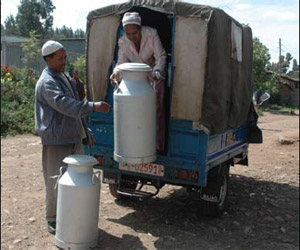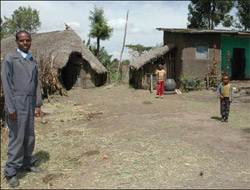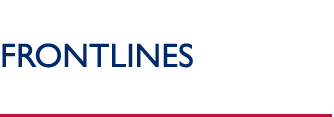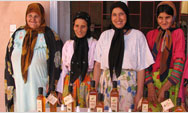 |
|
 |
 |
| |
 |
| |
 |
 |
 |
USAID Information:
External Links:
|
|
 |
 |
|
Ethiopian Farmers Learn to Produce Milk, Butter, Cheese
FrontLines - April 2009

Milk collection workers at Asallah Dairy Co-op.
|
Asallah, Ethiopia—Until two years ago, Ato Abebe scratched out a meager subsistence
raising wheat and other cereals on a hectare of land in central Ethiopia. His family went to bed hungry several months a year.
Today, Abebe, who lives near Asallah, 180 kilometers south of Addis Ababa, makes nearly $100 per month, lives in a new house, and plans to expand his dairy business while teaching his neighbors about it.
Abebe’s turn of fortune came about in 2006, when he signed on as an apprentice dairy farmer with Land O’Lakes International Development, a
division of the U.S. dairy company
Land O’Lakes Inc. USAID funds the
program with a $5 million grant.
“Before, from June to August, we did not have food to eat or seeds to plant for the next season,” Abebe said.
The farmer stands outside his new, one-room house with its
metal roof. His old thatched house is now inhabited by the source of his new wealth, a cow and a heifer. “Having a milk-producing cow is like having a steady salary,” he said.
Abebe plans to acquire four more cows through direct purchase
or artificial insemination with foreign bull semen brought to Ethiopia by Land O’Lakes and another development group, World Wide Science.
In the two years that the Asallah dairy project has been under way, milk prices have risen from roughly 20 cents to 50 cents per liter. Cows produce as much as 13 liters a day and output is rising as a result of crossbreeding with highly productive
foreign dairy cattle.

Ato Abebe stands outside his former house, left, and his current home.
|
In exchange for Land O’Lakes’ tutoring, Abebe teaches other farmers in the
area who want to emulate
his success.
“We want him to transfer our knowledge,” said Asfaw Tolessa, Land O’Lakes dairy extension manager for Ethiopia, where 130 farmers were selected for the program. Each one, in turn, teaches another 50 farmers.
To deal with periodic drought and exhausted land, the farmers learn to plant napier grass, also known as elephant grass, which
contains high protein and resists drought with its deep roots.
The grass can be harvested every three weeks, stored in airtight
plastic bags, and kept for years as animal fodder.
The project hopes to include farmers’ wives but proceeds cautiously
because of rural traditions
that define women’s roles narrowly.
Encouraging dairy farming would have no lasting effect without
consistent markets for milk. Swedish projects in the 1970s failed when milk prices crashed after several years. To avoid this, the USAID program created commercial
sales outlets that sell milk as well as cream, butter, and cottage
cheese, which are processed to have longer shelf lives than milk. USAID is encouraging Ethiopian banks to finance a
modern dairy-processing plant for the cooperative.
Membership in the Asallah Dairy Co-op, up the road from Abebe’s farm, rose from 37 in 2006 to 90 today. Average daily milk collection rose from 70 liters per day to 700 liters. Milk prices doubled while animal feed costs fell by half.
“We are making a lot of milk and a lot of money,” said co-op member Almaz Gebre Silasse.
★ - P.K.
These articles originally appeared on America.gov, a Web site produced by the State Department’s Bureau of International Information Programs; reproduced with permission.
FrontLines is published
by the Bureau for Legislative and Public Affairs
U.S. Agency for International Development
To have FrontLines delivered
to you via postal mail, please subscribe.
Material should be submitted
by mail to Editor, FrontLines, USAID,
RRB, Suite 6.10, Washington, DC 20523-6100;
by FAX to 202-216-3035; or by e-mail to frontlines@usaid.gov
To view PDF files, download
the Adobe
Acrobat Reader.
Back to Top ^
|




